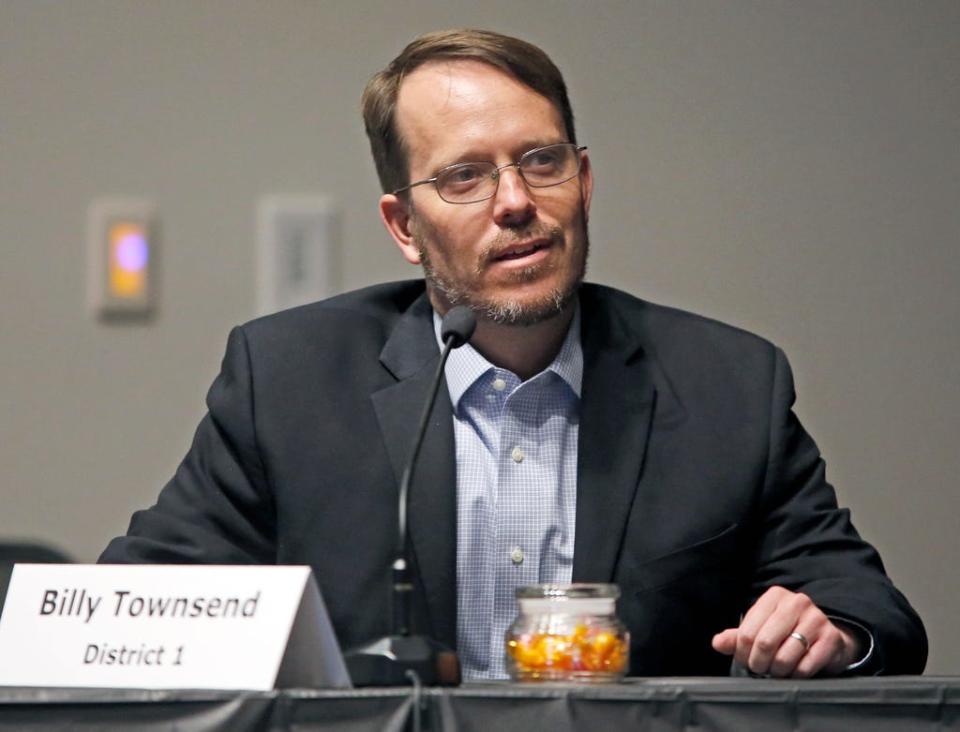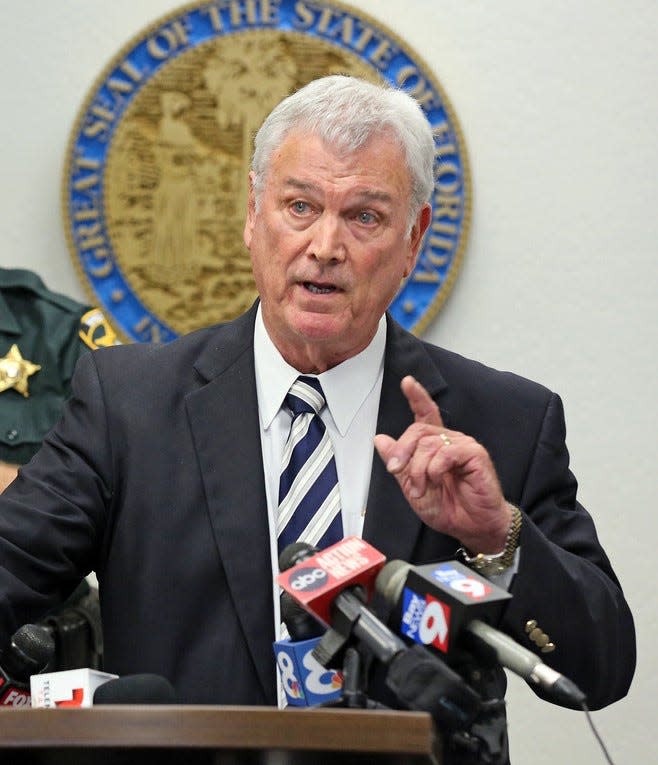Activist and retired state attorney clash over testimony at Leo Schofield parole hearing
- Oops!Something went wrong.Please try again later.
Jerry Hill, the retired state attorney in Polk County, has rejected an accusation that he misled members of a state parole board in arguing against the release of a man convicted of murder.
A lawyer representing Hill submitted a response Friday to The Florida Bar over a complaint filed in June by Lakeland activist Billy Townsend. The complaint mainly involved Hill’s testimony to the Florida Commission on Offender Review in 2020 as it considered the possible parole of Leo Schofield Jr., convicted in 1989 for the stabbing death of his wife, Michelle Saum Schofield.
Hill retired in 2017 as the top prosecutor for Polk, Highlands and Hardee counties, but he went to Tallahassee in 2020 to argue against Schofield’s release from prison, representing the State Attorney’s Office for the 10th Judicial Circuit.
In the 24-page complaint, Townsend alleged that Hill misled the three members of the parole board by mixing references to Schofield and his father, along with Jeremy Scott, a convicted murderer who has said that he killed Michelle Schofield. Townsend, a former Polk County School Board member and an independent writer, accused Hill of violating The Florida Bar’s rules on candor toward the tribunal, misconduct and truthfulness in statements to others.
In the filing, Townsend quoted extensively from Hill’s statement at the parole hearing on Jan. 8, 2020, when he spoke on behalf of current State Attorney Brian Haas.
Schofield’s case has attracted national attention through the podcast “Bone Valley,” created by Pulitzer Prize-winning author Gilbert King. The 12-part podcast, which asserts that Schofield is innocent, as he has claimed since his conviction, has drawn an audience of more than 7 million, according to its production company.
Latest in Schofield case State board denies parole for Schofield, convicted in 1987 Lakeland murder
Townsend has written repeatedly about the Schofield case in a newsletter he publishes on the Substack platform. Citing details from the trial and the podcast, he argues that Schofield was wrongly convicted and that Scott is the actual killer.
The Florida Commission on Offender Review denied parole to Schofield at the 2020 hearing and did so again at a meeting in May. At this year’s hearing, though, the three-member panel voted for a release date of June 2024.
In the complaint, Townsend accused Hill of “(r)epeated, constant conflation of Leo Schofield Jr. and his father, Leo Schofield Sr. in ways so imprecise and careless as to suggest an intentional effort to confuse the public and the commissioners.”
Shifting references?
In his presentation to the parole board, Hill discussed the search for Michelle Schofield after her husband reported her missing in 1987. Both Leo Schofield Jr. and his father searched for her, along with law-enforcement officials, according to news coverage at the time. Schofield Sr. ultimately found her body, covered by a piece of plywood in a canal near Interstate 4.

Townsend included excerpts from a transcript of Hill’s statement to the commission. He wrote that Hill repeatedly mentioned Schofield Sr., who was never charged in connection with the murder. Hill referred to the elder Schofield 25 times, “using seven different ways of identifying him,” Townsend wrote.
The complaint quotes from the transcript, in which Hill used the name “Leo” twice in reference to the father before clarifying the reference:
“Again, how was the body found? Leo said he was driven by an inner force to go back to the pit area again, and on Friday he started searching along State Road 33. Leo said he felt drawn to that area and felt that Michelle was calling out to him. He said he had told Detective Russell that his daughter-in-law was within a certain distance.”
Townsend alleges that Hill’s use of the name “Leo” alone in describing a supposed premonition that directed Leo Schofield Sr. to the canal where he found Michelle’s body might have led the parole board to think he was referring to the son.
A wrongful conviction? Podcast explores 1987 Polk murder and the man in prison for it
“I encourage any investigator to listen to the audio file in its entirety, put yourself in the place of the commissioners or the public, and determine if you could follow and process in real time Hill’s shifting arguments and references to Schofield Sr. and Jr.,” the complaint said.
Townsend also cited Hill’s statement: “In September, the defendant sends a letter to counsel admitting to the murder of Mrs. Schofield.”
Hill had previously described Leo Schofield Jr. as “defendant” 18 times before using the word in reference to Scott, Townsend wrote. He suggested that the parole board members might have inferred that Schofield had confessed, though he has always maintained his innocence. If that was an error, Hill should have corrected it promptly, Townsend wrote.
Scott confessed to killing Michelle before appearing to recant at a hearing in 2017. He has reasserted his guilt to the “Bone Valley” team, and his fingerprint was found on a window of Michelle’s abandoned car. Prosecutors say his practice of stealing stereos from vacant vehicles explains the fingerprint and that his confessions lack credibility.
In the complaint, Townsend also described an exchange he had with Hill this year before a Polk County Commission meeting, at which Townsend urged commissioners to write a letter supporting a new trial for Schofield. (The commission took no action.)
Townsend wrote that he approached Hill before the meeting and said, “Good morning, Jerry. When are you going to correct your lie at the parole commission?”
He wrote that Hill responded, “F--- you.”
That was basis for Townsend’s claim of misconduct.
Ex-prosecutor responds
The Florida Bar originally gave Hill a deadline of July 21 to respond but granted an extension until Aug. 11. The response was submitted by Douglas A. Wyler, a lawyer with Jacobs, Scholz and Wyler, a Fernandina Beach firm.
In the two-page response, Wyler wrote that Hill “without equivocation stands by every word contained in his comments to the Parole Commission regarding Leo Schofield. Notably, all three (3) commissioners that heard Mr. Hill’s argument are still in office and we urge the Florida Bar to contact each commissioner and inquire whether they felt deceived or lied to. In fact, such an investigation will show that none of the commissioners believe that Mr. Hill lacked candor or truthfulness in his statements to the tribunal.”
Wyler wrote that Townsend “knows little or nothing about how the parole commission functions.” He wrote that commissioners spend time reviewing material on a case before a hearing is held and often hold meetings in advance with advocates for a defendant or victim. Such a meeting occurred before the 2020 Schofield hearing, he wrote.

“Often, if a commissioner is unclear on a point of argument, they will verbally request clarification prior to voting on the case,” Wyler wrote. “Further, quite often, a commissioner will call a party and request records or documentation on a case, which Mr. Hill believes took place here. Consequently, the commissioners were not in any way misled or deceived by Mr. Hill’s argument. In fact, they fully understood the positions taken by the respective parties.”
Noting that Townsend referred to the 2023 hearing, at which Assistant State Attorney Jacob Orr represented Haas, Wyler wrote that Townsend seemed to be arguing for Schofield’s innocence rather than finding problems with Hill’s statements.
Townsend “appears to be seeking personal notoriety via his involvement with the Leo Schofield matter,” Wyler wrote. He referred to two articles Townsend posted on Substack in July, reporting on his complaint before it was assigned a case number and distributed to Hill and then reporting on the extension of Hill’s deadline to respond.
“Simply put, Mr. Townsend appears to be using the Leo Schofield matter and the instant bar complaint to further his own interests, and to inappropriately harass Mr. Hill,” Wyler wrote.
Judicial circuits After 2nd suspension of a state attorney, fears grow over GOP plan to consolidate districts
The lawyer did not deny Townsend’s claim that Hill used foul language in responding to him before the Polk County Commission meeting in March. Wyler wrote that Townsend surprised Hill when he approached and “got in Mr. Hill’s face” before addressing him.
Wyler wrote that “when a person gets in someone else's face and calls them a liar, the accuser should appreciate the fact that the accused might consider the accuser’s statement to be ‘fighting words.’”
He added: “While Mr. Hill’s response was not the best choice of words, under the circumstances it does not rise to the level of actionable misconduct. Finally, Mr. Townsend’s statement to Mr. Hill clearly invited a response. However, it appears that Mr. Townsend wants to be perceived as a victim in turning a personal conversation into a public matter.”
Wyler also wrote that Hill didn’t believe anyone else heard the exchange, other than possibly Orr.
In conclusion, Wyler wrote that Townsend’s claims did not indicate any ethical violations and that no discipline for Hill is warranted.
Hill declined to offer comment beyond his lawyer’s response to the complaint. A member of The Florida Bar since 1972, he served as state attorney for the 10th Circuit from 1984 to 2017.
What happens next?
Townsend shared a draft of the rebuttal he plans to submit. He wrote that Hill's statement of standing by his words at the 2020 hearing amounted to "a confession." He also said that Hill's statement at the hearing contained factual inaccuracies, regardless of whether commission members say they were confused.
He also disputed the description that he had been aggressive at the County Commission meeting or that he "got in Hill's face."
Townsend has questioned whether taxpayer money is being used to defend Hill, a private lawyer. Jacobs, Scholz and Wyler represents the Florida Prosecuting Attorneys Association, a nonprofit comprising elected state attorneys.
The executive director of the FPAA referred a reporter to Arthur I. “Buddy” Jacobs, general counsel for the organization. Jacobs did not respond to a voice message left last week.
In response to a message left for Melinda Coonrod, chair of the Florida Commission on Offender Review, spokesperson Chris Taylor said by email: “The Commission respectfully declines to issue a statement on an issue presented to and pending before the Florida Bar, a tribunal, or a court. The Commission notes, however, Jerry Hill’s long service to the State of Florida as the elected State Attorney for the Tenth Judicial Circuit and his continued service to the State and its people after leaving office.”
After receiving the response and rebuttal, the Florida Bar’s intake counsel may determine that no discipline is warranted and close the file or refer it for further investigation to the branch office that covers the lawyer’s judicial circuit. That office can dismiss the complaint, recommend diversionary measures or forward the case to a grievance committee for additional investigation.
That committee may still determine that there is no probable cause, or it may issue a finding of minor misconduct or suggest diversionary action. If it finds probable cause for discipline, the case is reviewed by the Bar’s Board of Governors.
Gary White can be reached at gary.white@theledger.com or 863-802-7518. Follow on X @garywhite13.
This article originally appeared on The Ledger: Activist files Bar complaint against ex-prosecutor in Schofield case

